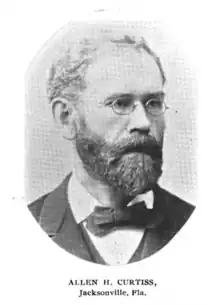Allen Hiram Curtiss | |
|---|---|
 | |
| Born | c. 1845 |
| Died | 1907 |
| Burial place | Hillside Memorial Cemetery and Park, Central Square, Oswego County, New York, USA |
| Occupation | Botanist |
| Parent |
|
Allen Hiram Curtiss (c. 1845–1907) was an American botanist.[1][2] He may have been the first professional botanist to reside in Florida.[1] His work included the discovery of fern species at the Pineola Grotto.[3] He collected many specimens and was an author of botanical books. The Florida Agricultural Experiment Station (established in 1888 as a division of the Florida College of Agriculture at Lake City), employed Curtiss for a brief tenure and several collections at the University of Florida Herbarium are named for him.[4] Several species are named for him including Calamagrostis curtissii[5] and Polygala curtissii.[6]
His mother, Floretta Allen Curtiss was a keen phycologist, whose biographical sketch Allen H. Curtiss published in 1899.[7]
.pdf.jpg.webp)
References
- 1 2 Ward, Daniel B. (2005). "Rediscovery of Sisyrinchium corymbosum Bicknell (Iridaceae), Lost for One Hundred Years". Castanea. 70 (2): 155–157. JSTOR 4034283.
- ↑ "HUH - Databases - Botanist Search". kiki.huh.harvard.edu. Retrieved 2014-10-09.
- ↑ Journal New York Botanical Gardens pages 35, 36
- ↑ "History of the University of Florida Herbarium (FLAS)". flmnh.ufl.edu. Retrieved 2014-10-09.
- ↑ CRC Dictionary of Grasses page 423
- ↑ Porcher, R.D.; Rayner, D.A. (2001). A Guide to the Wildflowers of South Carolina. University of South Carolina Press. p. 148. ISBN 9781570034381. Retrieved 2014-10-09.
- ↑ "Allen Hierome Curtiss - North Carolina Botanical Garden". Retrieved 2022-08-07.